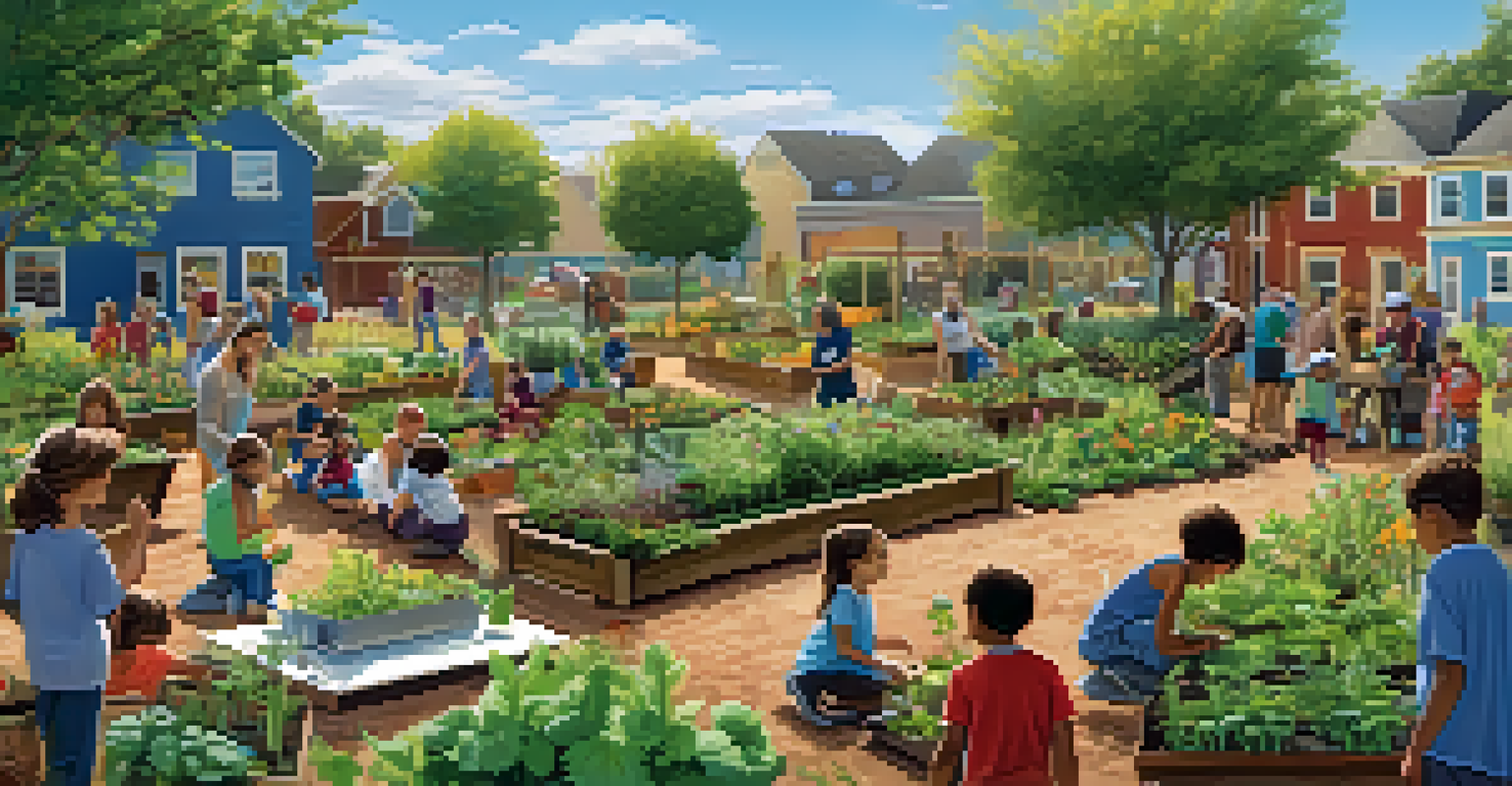Sustainable Practices in Palm Springs Community Gardens

Importance of Sustainable Practices in Community Gardening
Sustainable practices in community gardening are vital for promoting environmental health and resilience. By utilizing eco-friendly methods, these gardens can support biodiversity and reduce waste. In Palm Springs, community gardens not only provide fresh produce but also foster a sense of community and responsibility towards the environment.
The greatest threat to our planet is the belief that someone else will save it.
When local residents engage in gardening, they cultivate more than just plants; they cultivate awareness about sustainable living. This can lead to healthier lifestyles, as people become more connected with their food sources. In a place like Palm Springs, where the desert climate poses unique challenges, sustainable practices become essential for thriving gardens.
Moreover, these practices can serve as a model for other communities, showcasing how small actions can lead to significant environmental impacts. By sharing knowledge and resources, Palm Springs community gardens set a precedent for sustainability, inspiring others to follow suit.
Water Conservation Techniques in Palm Springs Gardens
Water conservation is a critical focus for community gardens in the arid climate of Palm Springs. Techniques such as drip irrigation and rainwater harvesting help maximize water efficiency while minimizing waste. These systems ensure that plants receive the right amount of water without over-saturating the soil.

Additionally, gardeners often implement xeriscaping principles, using drought-tolerant plants that require less water. This not only conserves water but also enhances the garden’s aesthetic appeal with native plants that thrive in the local environment. By adopting these methods, garden participants learn to appreciate the value of each drop of water.
Sustainable Practices Enhance Gardens
Community gardens in Palm Springs promote environmental health through sustainable methods that foster biodiversity and reduce waste.
Through workshops and community education, these gardens empower residents to adopt similar techniques at home. This ripple effect can significantly influence the community’s overall water usage, making every household a contributor to sustainability.
Soil Health and Organic Practices in Community Gardens
Healthy soil is the foundation of any successful garden, and community gardens in Palm Springs prioritize organic practices to maintain it. By avoiding synthetic fertilizers and pesticides, these gardens promote a balanced ecosystem that supports beneficial insects and microorganisms. This not only boosts plant health but also contributes to the overall sustainability of the community.
Gardening adds years to your life and life to your years.
Composting is a popular method in these gardens, where organic waste is transformed into nutrient-rich soil amendments. This practice not only reduces landfill waste but also enriches the soil, making it more productive. Gardeners often share composting tips, fostering a sense of collaboration among participants.
Additionally, crop rotation and companion planting strategies help prevent soil depletion and control pests naturally. These methods allow gardeners to cultivate a diverse range of plants while preserving the health of their soil, ensuring that future generations can enjoy the benefits of community gardening.
Community Engagement and Education in Gardens
Community engagement is at the heart of Palm Springs’ gardening initiatives. Local gardens often host workshops, classes, and events that invite residents to learn about sustainable practices. This not only builds skills but also strengthens community bonds as participants share their experiences and knowledge.
By involving schools and youth programs, these gardens educate the next generation about the importance of sustainability. Children's hands-on experiences in gardening can spark a lifelong interest in environmental stewardship. This early engagement helps cultivate a culture of sustainability within the community.
Water Conservation is Essential
In the arid climate of Palm Springs, techniques like drip irrigation and xeriscaping are crucial for maximizing water efficiency in community gardens.
Moreover, community gardens often collaborate with local organizations to expand their reach and impact. These partnerships can lead to larger initiatives, such as neighborhood clean-up days or sustainability fairs, creating a unified effort towards a greener Palm Springs.
Benefits of Biodiversity in Community Gardens
Biodiversity plays a crucial role in the health and resilience of community gardens. By planting a variety of species, gardeners can create a balanced ecosystem that is less vulnerable to pests and diseases. This diversity not only supports wildlife but also enhances the garden's productivity.
In Palm Springs, many gardens incorporate native plants that are well-adapted to the local climate. These plants require less water and care, making them ideal for sustainable gardening. By embracing local flora, gardeners contribute to the preservation of the region's biodiversity.
Furthermore, diverse plantings can lead to a richer harvest, offering a wide array of fruits, vegetables, and herbs. Gardeners can experiment with different crops, sharing their results and recipes, which fosters a sense of community and creativity around food.
Local Partnerships Supporting Sustainable Gardening
Local partnerships are essential for the success of sustainable community gardening efforts in Palm Springs. Collaborations with nonprofits, schools, and local businesses can provide resources and expertise that enhance gardening initiatives. These partnerships often help secure funding for tools, educational programs, and community events.
For example, local nurseries may donate plants or offer discounts to community gardens, while educational institutions might provide volunteers for garden maintenance. Such synergies not only benefit the gardens but also promote a culture of sustainability throughout the community.
Community Engagement Drives Education
Workshops and collaborative efforts in Palm Springs community gardens educate residents about sustainability and strengthen community bonds.
Additionally, these partnerships can create networking opportunities for gardeners, fostering connections that lead to shared knowledge and resources. This collaborative approach amplifies the impact of sustainable practices, making them accessible to a broader audience.
The Future of Community Gardens in Palm Springs
As Palm Springs continues to grow, the future of community gardens looks promising, especially in terms of sustainability. With increasing awareness of environmental issues, more residents are likely to get involved in gardening initiatives. This could lead to the establishment of additional gardens, expanding access to fresh produce and green spaces.
Innovative technologies, such as vertical gardening and hydroponics, may also play a role in the evolution of community gardens. These methods can maximize space and resources, making gardening more feasible in urban settings. By incorporating these advancements, Palm Springs can remain at the forefront of sustainable gardening practices.

Ultimately, the commitment to sustainability in community gardens can inspire other cities to adopt similar initiatives. As Palm Springs leads by example, it can cultivate a community that not only enjoys the fruits of their labor but also takes pride in protecting the environment for future generations.